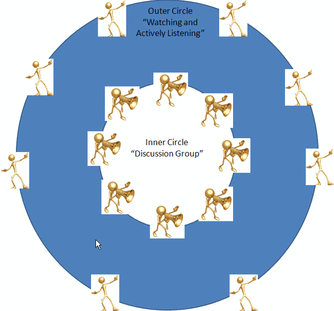When was the first time you remember encountering philosophy? I don't mean taking endless notes on a couple of old, dead guys in class purely for the purpose of passing an exam. I mean the moment when you realized that you had an opinion about life or yourself or how the world around you works. An opinion that mattered. For me this moment came freshman year of high school in fourth period Etymology. It was the first time that I was introduced to a teaching method called the Socratic seminar.

If you google Socrates' teaching method, you will find a definition something similar to:
"Socratic debate, is a form of cooperative argumentative dialogue between individuals, based on asking and answering questions to stimulate critical thinking and to draw out ideas and underlying presuppositions."
While Socrates did not actually use the exact style of teaching that the Socratic seminar utilizes in classrooms today, he was known for walking among his students and asking them questions. This shifted philosophy from a simple hierarchical flow of knowledge from teacher, or philosopher, to student into a new era where knowledge could be gained from questioning the world around you.

"It has been said that Socrates' greatest contribution to philosophy was to move intellectual pursuits away from the focus on `physical science' and into the abstract realm of ethics and morality."
( https://www.ancient.eu/socrates/ )
Socrates was a Greek philosopher who lived in Athens c. 470 BCE - c. 399 BCE. Little is known of his life aside from recorded writings from his students, Plato and Xenophon, as well as the plays of Aristophanes. Accordingly, his "Socratic method" laid the groundwork for Western systems of logic and philosophy. In his teachings, Socrates attempted to establish an ethical system based on human reason rather the theological doctrine. He thought the ultimate wisdom came from knowing oneself, and that the more one knows , the greater his or her ability to reason and make choices, motivated by the desire for true happiness. Because Socrates was raised by a mason and a midwife, he more than likely had little chances for an education, which I believe is why he taught by asking questions. He claimed he knew little to nothing and he was probably correct when compared to those who were raised in higher education. He is thought to have been wise to recognize his own ignorance. Because he made others think through questions for their own answers, it made his opponents look foolish, and allowed for Socrates himself to be admired by many.
"During Socrates's life, Athens was going through a dramatic transition from hegemony in the classical world to its decline after a humiliating defeat by Sparta in the Peloponnesian War. Athenians entered a period of instability and doubt about their identity and place in the world. As a result, they clung to past glories, notions of wealth, and a fixation with physical beauty. Socrates attacked these values with his insistent emphasis on the greater importance of the mind. While many Athenians admired Socrates's challenges to Greek conventional wisdom and the humorous way he went about it, an equal number grew angry and felt he threatened their way of life and uncertain future."
This More than likely was the cause for his execution, along with his refusal to bribe the guards to run away into exile. He was given hemlock, and drank it without hesitation, briefly describing his death as a release of the soul from the body before he took his last breathe.
Three of Socrates' main principles were :
1. Discover and pursue your life's purpose
2. Care for your soul
3. Be a good person and you will not be harmed by outside forces
These three principles tie into the idea that I want to discuss and leave you all with after my presentation. If we focus on Socrates' teaching method of questioning and apply his three main principles to those questions, we will still not be able to fully understand the idea of personal identity, what our sense of ethics and morals are. It is not enough to simply ask yourself questions. I think it is vital to take Socrates' philosophy a step further and introduce the idea of the method of Socratic seminars - but outside of the classroom setting. Though it was in a classroom setting that I was introduced and accustomed to having a student led discussion where I was able to have sensible discussions with my peers, I think it is important to find a few people where you can have similar discussions about life. Simply finding a belief you agree with is not enough. You have to understand what you do not believe in before you can have a belief. Talking to others can offer the chance to hear other view points that you may have never thought about and inevitably helps you to navigate through your ideas of ethics and morals.
Quiz Questions:
1. How did Socrates influence or change the way philosophy could be taught?
2. What has been said to be Socrates' greatest contribution to philosophy?
3. What is a "Socratic seminar"?
4. What was Socrates' first principle?
5. What was Socrates' second principle?
6. What was Socrates' third principle?
Discussion Questions:
1. Do you, or do do you not, agree that having meaningful conversations with others can help you find yourself in ways that having a conversation with just yourself never could. Why or why not?
2. Would you agree with Socrates on his three main philosophical principles, or would you change them. If so, what would you change them to?
3. Is the idea of the Socratic seminar, or Socratic method, a valid way to teach or enhance learning philosophy?
Do you, or do do you not, agree that having meaningful conversations with others can help you find yourself in ways that having a conversation with just yourself never could. Why or why not?
ReplyDeleteI do believe the above statement. When you have conversations with yourself then you are only seeing it from 'one' perspective. If you have another brain to talk to then things that otherwise would not have been revealed to you come to light. I prefer to be in perpetual convo with myself but sometimes I venture down from my mountain top to, as my mom puts it, "interact with the peasants." H2
Would you agree with Socrates on his three main philosophical principles, or would you change them. If so, what would you change them to?
ReplyDeleteI agree with the majority of his points. The only thing I would change about the third one is instead of "be a good person" I'd say "have faith in God." Many would chuckle at this and write me off. That all fine and dandy. H2